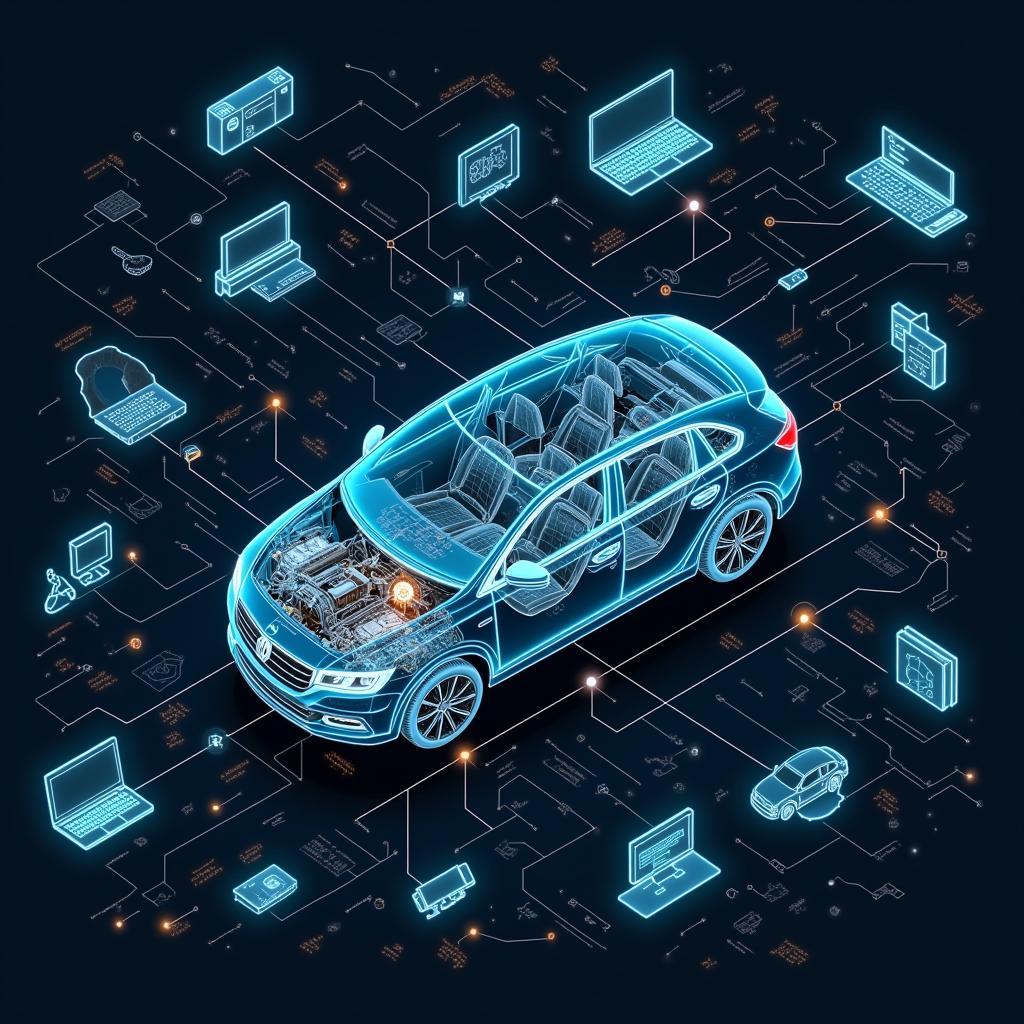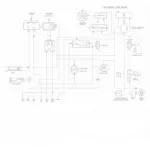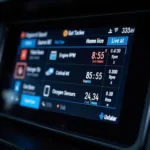Modern vehicles are complex machines relying heavily on a network of sensors to monitor performance and ensure smooth operation. When a problem arises, these sensors act as the car’s nervous system, sending vital information to the onboard computer. This is where auto sensor car diagnostics come into play, offering a window into your vehicle’s health.
The Crucial Role of Sensors in Your Car
From monitoring engine temperature and tire pressure to controlling fuel injection and airbag deployment, sensors are the unsung heroes of your car’s performance. These small electronic components constantly gather data, ensuring optimal efficiency, safety, and compliance with emission standards.
Common Symptoms of Faulty Car Sensors
A malfunctioning sensor can disrupt your car’s harmony, leading to various issues. Look out for these telltale signs:
- Illuminated Check Engine Light: One of the most common indicators, this warning light could signal a faulty sensor, among other problems.
- Poor Fuel Economy: A drop in your car’s MPG can indicate a problem with the oxygen sensor or mass airflow sensor.
- Rough Engine Performance: Misfiring, stalling, or a lack of power can be attributed to faulty crankshaft, camshaft, or throttle position sensors.
- Transmission Problems: Erratic shifting, slipping gears, or a complete transmission failure could be linked to a faulty transmission speed sensor.
The Importance of Timely Auto Sensor Car Diagnostics
Ignoring warning signs from your car’s sensors can lead to costly repairs and even compromise your safety.
Here’s why timely diagnostics are essential:
- Accurate Problem Identification: Pinpointing the root cause of the issue prevents unnecessary and potentially expensive component replacements.
- Cost Savings: Early detection allows for minor repairs before they escalate into major (and expensive) problems.
- Enhanced Safety: Identifying faulty sensors related to braking, airbags, or stability control ensures your safety and that of your passengers.
- Improved Vehicle Performance: Addressing sensor issues optimizes fuel efficiency, engine performance, and overall drivability.
What Happens During Auto Sensor Car Diagnostics?
Auto sensor car diagnostics involve retrieving and interpreting data from your car’s computer using a specialized scanner. This process allows technicians to:
- Read Error Codes: The scanner retrieves Diagnostic Trouble Codes (DTCs) stored in the car’s computer, providing clues about the malfunctioning sensor.
- Analyze Live Data: Real-time data from various sensors is displayed, allowing technicians to observe sensor behavior and identify inconsistencies.
- Perform Active Tests: The scanner commands specific sensors to activate, helping diagnose issues that aren’t evident through error codes or live data.
- Reset the System: After repairs, the scanner clears error codes and resets the system, ensuring the problem is resolved.
Choosing the Right Diagnostic Tools and Professionals
While DIY car diagnostic tools are available, it’s crucial to remember that interpreting the results and making accurate diagnoses require expertise. A qualified mechanic with access to professional-grade diagnostic equipment can:
- Accurately interpret complex sensor data
- Differentiate between sensor malfunctions and other potential issues
- Utilize advanced diagnostic procedures for complex problems
- Recommend and perform the necessary repairs efficiently
DiagFixPro: Your Trusted Partner in Auto Sensor Car Diagnostics
Navigating the world of auto sensor car diagnostics can be overwhelming. At DiagFixPro, we’re committed to providing car owners and professionals with the information and resources needed to make informed decisions.
Explore our website for:
- In-depth articles on specific sensors and common diagnostic issues.
- Reviews and comparisons of the latest car diagnostic scanners.
- Expert advice and tips for maintaining your car’s health.
Remember, early detection and accurate diagnosis are key to keeping your car running smoothly and ensuring a safe and enjoyable driving experience.
Frequently Asked Questions about Auto Sensor Car Diagnostics
1. Can I diagnose car sensor problems myself?
While basic DIY scanners are available, interpreting results and performing accurate diagnoses require specialized knowledge. Consulting a qualified mechanic is recommended.
2. How often should I have my car’s sensors checked?
It’s generally recommended to have your car inspected annually or as part of your regular maintenance schedule.
3. Can environmental factors affect car sensors?
Extreme temperatures, moisture, and road debris can impact sensor performance.
4. Are all car sensors the same?
No, each sensor is designed for a specific purpose and operates within a particular range of parameters.
5. What is the average cost of car sensor replacement?
Sensor replacement costs vary depending on the type of sensor, car model, and labor charges.
Looking for reliable car electrical diagnostics? DiagFixPro can help.
Don’t let a faulty sensor put a wrench in your plans. Contact us today for expert advice, diagnostic services, or to explore our range of top-rated diagnostic tools like the U581 car diagnostic scanner. Your car’s health is our priority.
Need assistance with your car’s diagnostics? Get in touch with our team of experts via WhatsApp: +1(641)206-8880, Email: [email protected]. We are available 24/7 to answer your questions and provide expert guidance.


